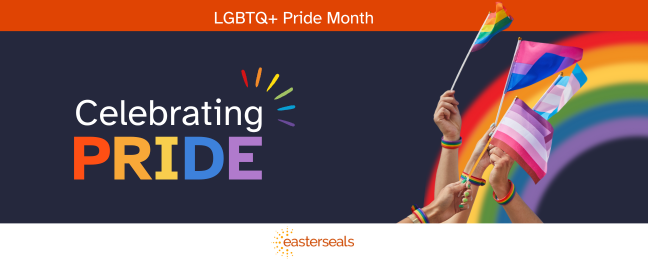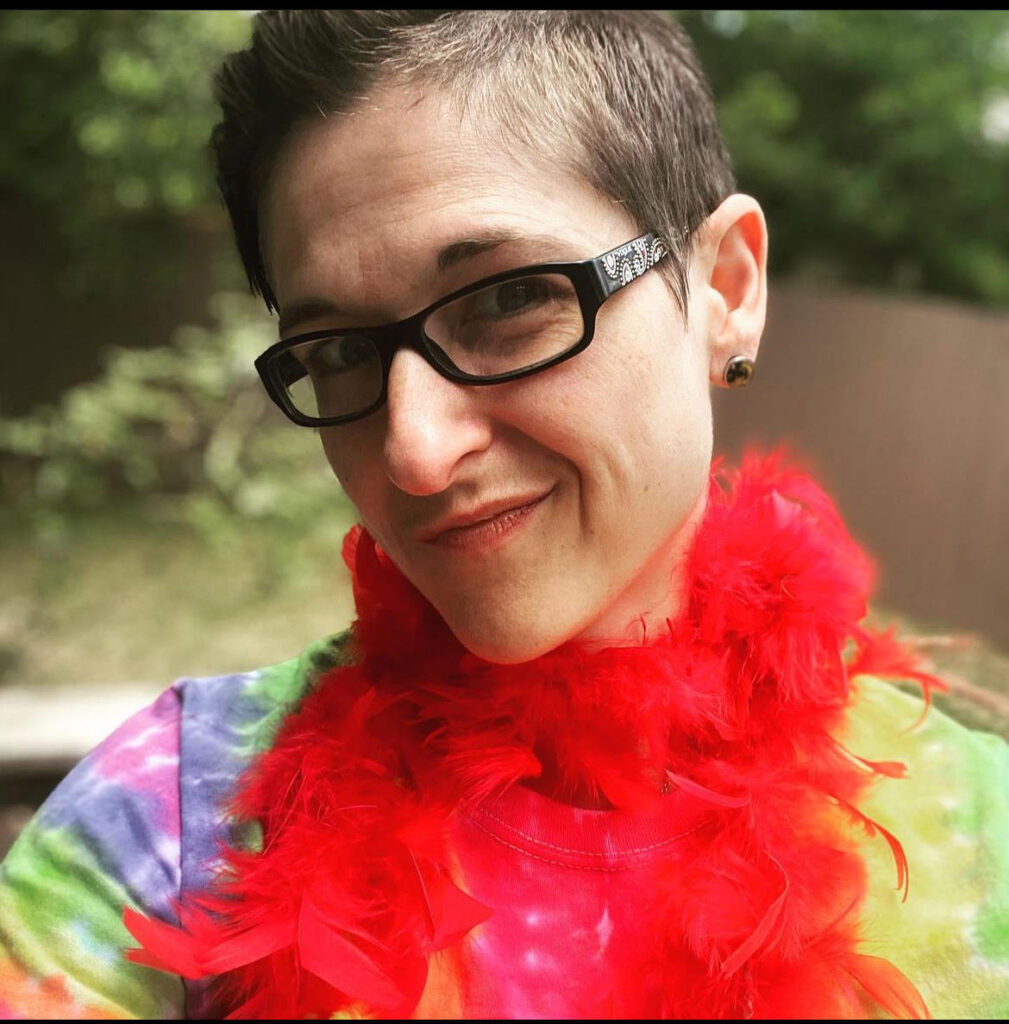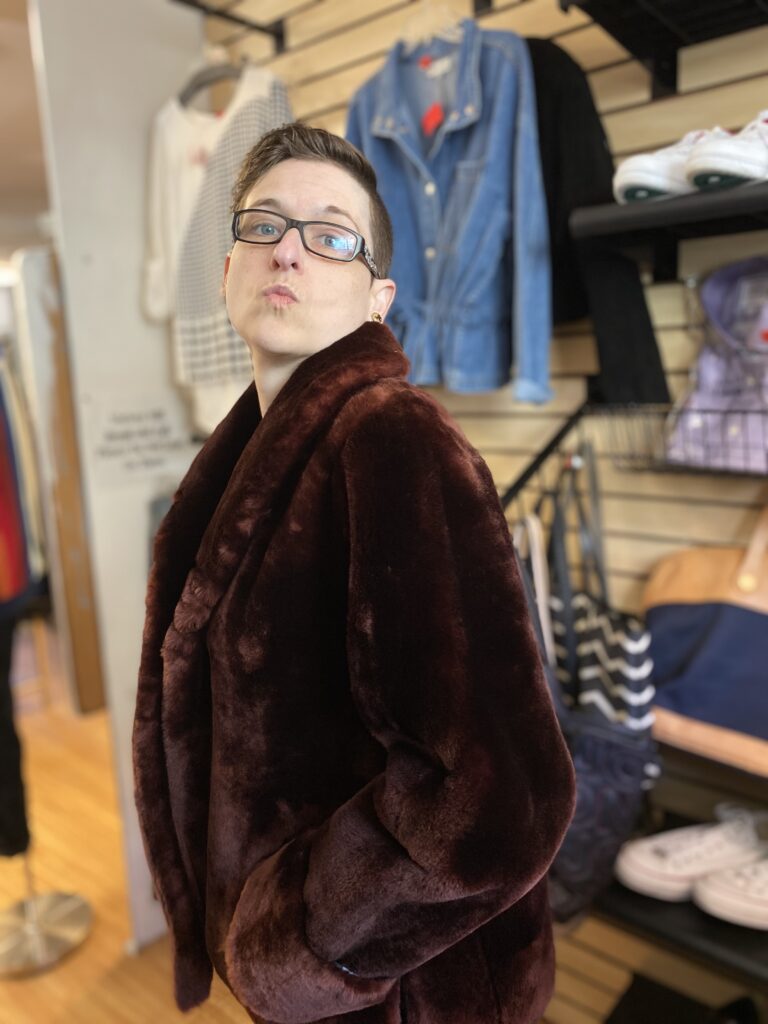Finding Pride at the Intersection of Disabled and Queer
by Blog Writers

By Christina Gann
I have been disabled since birth, both developmentally and physically — the source was a congenital disorder, a hole in my diaphragm, that most likely also led to my neurodivergent brain and my small intestines twisting inside my body. I had emergency surgery to remove all but 11 inches of my small intestines when I was nine years old after an excruciating two years of my resilient mother fighting to convince my doctors that I had a health problem at all. I was invisible to my doctors and so was my illness.
 I spent most of third grade in the hospital after my intestinal resection and when I returned, it was with a new set of hardware — a backpack full of nutritional life support and a Hickman heart catheter. I remember the crushing feeling of having to go to the community pool and having children run up and ask me what was sticking out of my chest. All I wanted was to hide, and I did. I did everything I could to not allow the world to “see” me as disabled or different.
I spent most of third grade in the hospital after my intestinal resection and when I returned, it was with a new set of hardware — a backpack full of nutritional life support and a Hickman heart catheter. I remember the crushing feeling of having to go to the community pool and having children run up and ask me what was sticking out of my chest. All I wanted was to hide, and I did. I did everything I could to not allow the world to “see” me as disabled or different.
I came out to my parents as a lesbian, Christmas 2005 sitting at an IHOP after an intoxicated night out with my college friends. I was so terrified I couldn’t even bring myself to face them or call them to break the news gently. I texted my mom, “Hi mom, I need to tell you, I am a lesbian. If you have any questions, you can call me in the morning.” As funny as it is when I talk about it now, I was riddled with internalized shame of myself, as who I am naturally attracted to was deemed unacceptable and sinful. I grew up in a small town in central Texas where the Bible was the word with no safe space for the queer experience.
The fear of being rejected by your pack is an instinct that triggers a primal reaction to conform. The moment I sent that text, I remember feeling like a weight had been lifted off my chest so I could finally breathe, and within the same breath, fear consumed me. I was paralyzed with the thought of losing all that I came to know, those that are most important and close to me. I feared being rejected by the very people I was supposed to depend on and look to when I needed support, the people who love me unconditionally. Was this the condition that would break those bonds? I felt raw and exposed. I was no longer hidden, living outside my pack that sheltered and protected me all those years. Unknown to me at the time, but coming out is a revolving door and each time I had to make myself susceptible to the possibility of ridicule and hatred in order to exist authentically. Fear is always sitting at the back of my mind that I would be taken out of the conversation and only my sexuality and gender would exist instead of my character. That I would suddenly be deemed unworthy of personhood based on my sexuality and gender expression alone.
As I matured into adulthood, I became hyper independent. I wouldn’t ask for help or accommodations and I certainly would not claim the identity of disabled. I was in a battle with my internalized ableism. I learned from societal views early on that accepting your disability meant giving up and limiting the possibilities. In media, literature, and marketing, this was the story that was told over and over again until it became the narrative I gave myself. I had to hide and deny my disability or I would never reach my fullest potential. When it’s the only story being told, it’s hard to see another perspective even if it’s your own.
 Though I lived much of my adult life as an out and proud lesbian, I struggled to be proud of my disabilities and how they shaped the way I walk through the world. Just like I hid my queerness, and twisted myself into a shape that looked like it might fit so that I might not be found out in my youth. I did the same thing with my disabilities. I fought accepting myself in order to fit the standard I was told was required to lead a peaceful existence.
Though I lived much of my adult life as an out and proud lesbian, I struggled to be proud of my disabilities and how they shaped the way I walk through the world. Just like I hid my queerness, and twisted myself into a shape that looked like it might fit so that I might not be found out in my youth. I did the same thing with my disabilities. I fought accepting myself in order to fit the standard I was told was required to lead a peaceful existence.
My disabilities excluded me from conversations about my life and the possibilities held there.
We believe what we see and this becomes our reality. I was taught at a very young age that being different meant danger. That being disabled meant that you were limited in what was possible. That accepting disability meant accepting defeat and a life less fulfilling. I grew up in a world that mistreated, misrepresented, and abandoned the disabled and cast a shadow on the queer and gender non-conforming existence. I struggled to unravel the false narrative of society from my own lived experience.
I spent most of my life hiding pieces of my identity that are interwoven into the fabric of my existence. I was afraid to accept myself for who I am because that meant living a life out in the open, exposed, raw and vulnerable against a society that would rather have me not exist at all. My sexuality, gender expression and disability out in the open meant living outside the boundaries of what society deemed acceptable and that took a whole lot of love to fight the fear if I chose self acceptance over societal expectations.
I am grateful today to know and understand that I can be proud of who I am every day. My disabilities, sexuality and gender expression do not dictate my capabilities or the possibilities of what I can achieve, but they do shape the way in which I exist. All the parts of myself I was afraid to show are a part of the beautiful tapestry that is me and are worthy of embracing, love and acceptance. I have finally found Pride in it all.
Christina Gann is a content creator, artist, and scientist based in Colorado. They love horror movies, gaming with friends, and their dog, Oreo. You can follow Christina on Twitch, TikTok, Instagram, and X.






